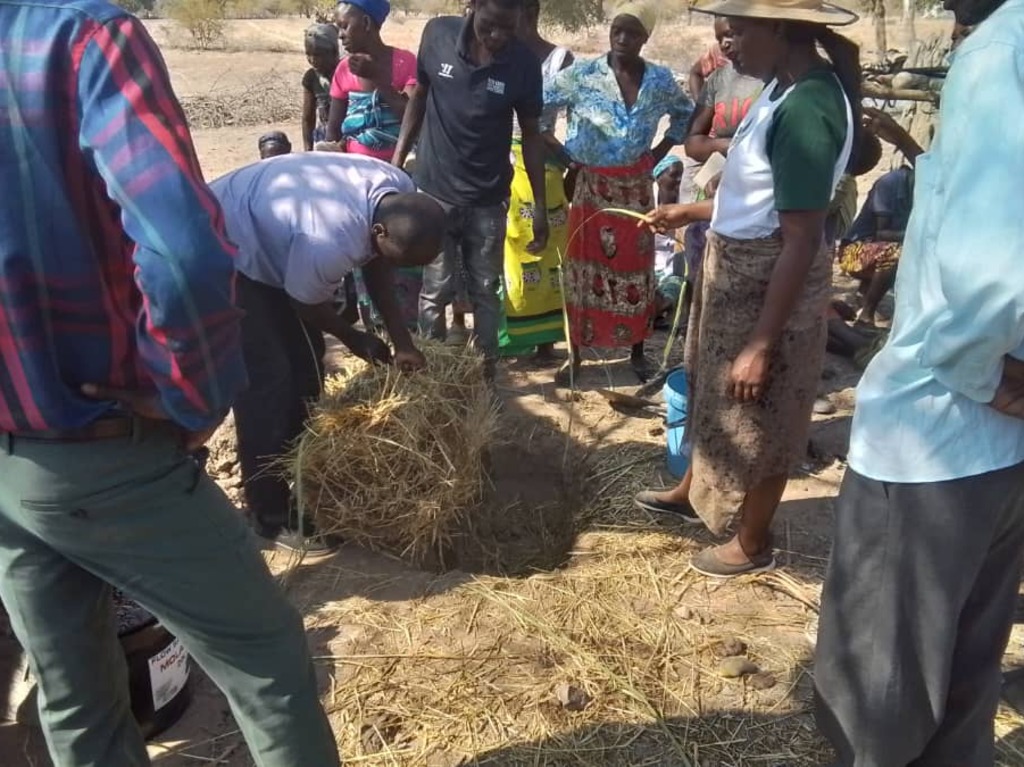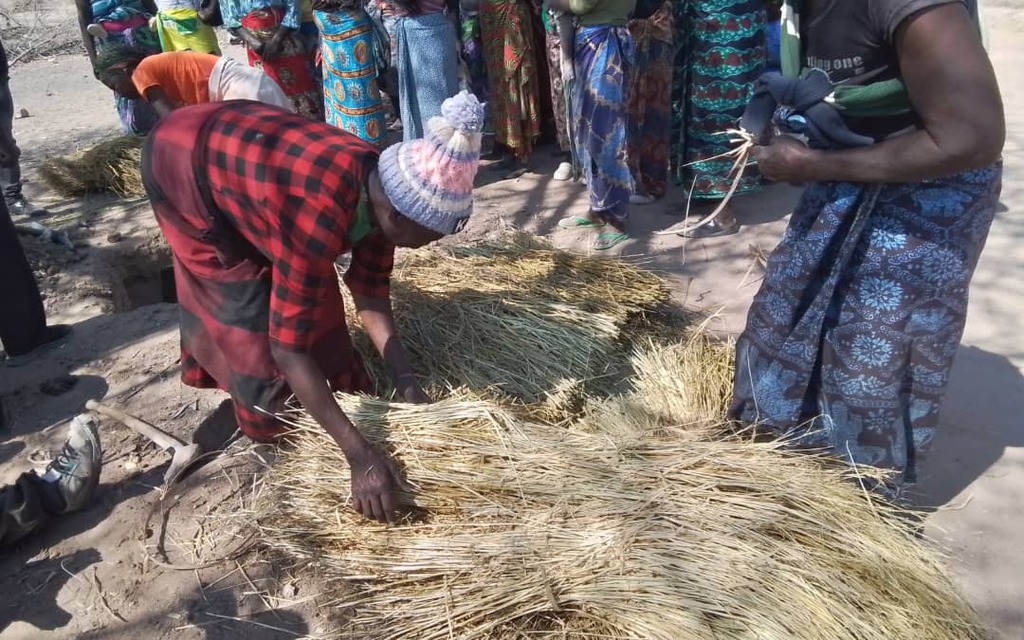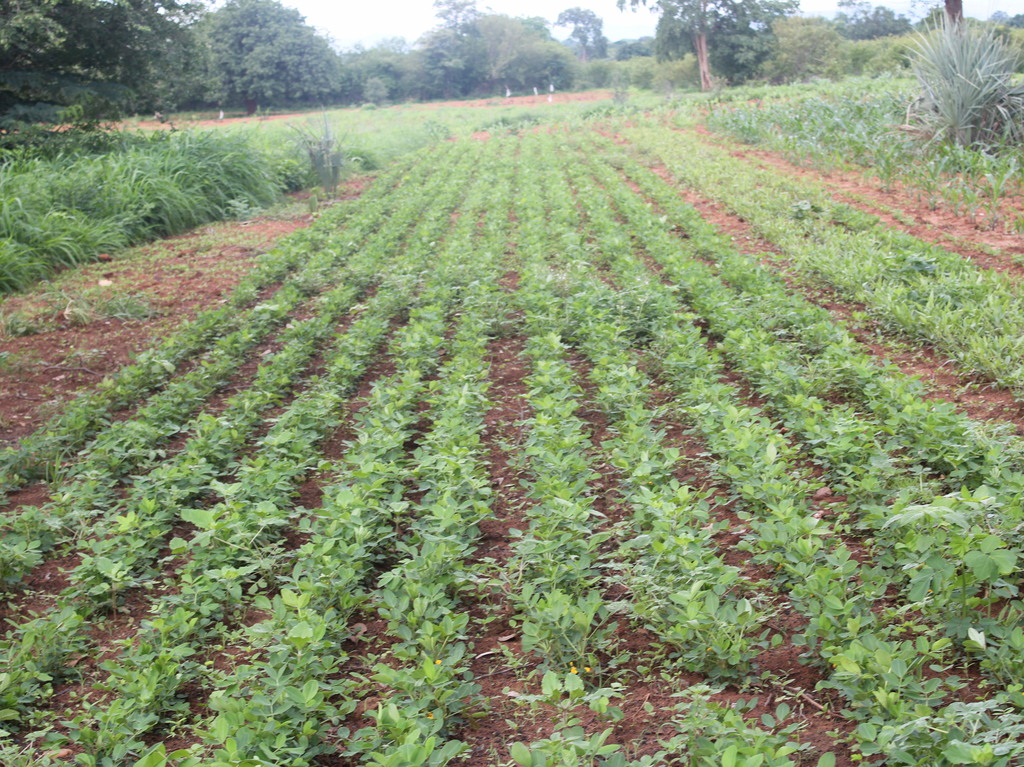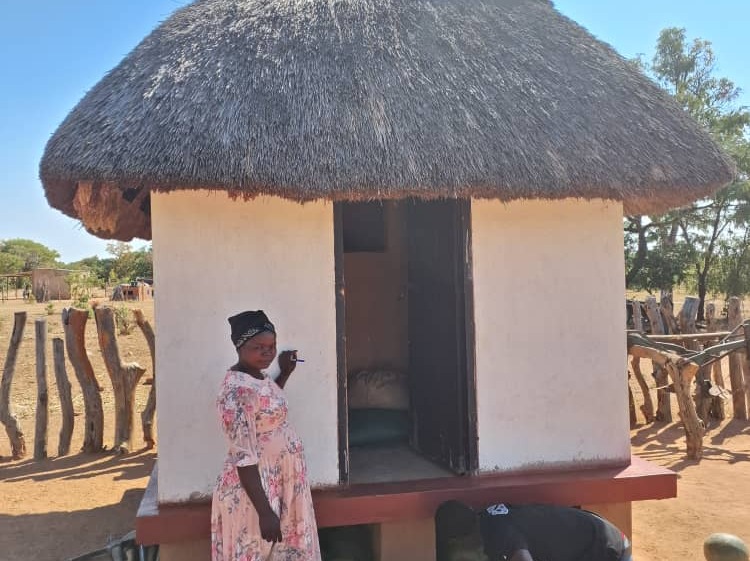
As part of the "Locally Led Indigenous Nature-Based Solutions for Climate Change Adaptation" project, KMTC has trained conservation agriculture (CA+) farmers in Binga district on the essential skill of fodder bale making. This strategic intervention aims to empower local communities to enhance their resilience and adaptability in the face of the pressing challenges posed by climate change.
KMTC's multi-faceted approach to this project includes the promotion of fodder legume production, processing, and value addition. Crops such as Lab Lab and Mucuna are being actively cultivated by the trained farmers, not only as a source of nutritious livestock feed but also for their inherent ability to fix nitrogen in the soil, thereby improving overall soil fertility.
The fodder bale making process has been designed with a strong emphasis on the utilization of locally available resources. Farmers have been equipped with the knowledge and techniques to construct simple, yet effective, bale-making structures using a pit with defined height, length, and width parameters. These bales are then securely tied using eco-friendly bark fibre, ensuring a sustainable and cost-effective solution.
The strategic production of fodder bales serves a crucial purpose during the lean seasons when the availability of natural pastures is scarce. By storing and preserving the excess fodder during periods of abundance, farmers can ensure a consistent supply of nutritious feed for their livestock, enabling them to maintain their herd's health and productivity throughout the year.
This initiative not only addresses the immediate needs of the farming community but also lays the foundation for long-term sustainability. The integration of nitrogen-fixing legumes into the cropping system not only enhances soil fertility but also contributes to the overall ecological balance, promoting more resilient and adaptable agricultural practices in the face of climate change.
Through this collaborative effort, KMTC, in partnership with the local farming community, is driving positive change and empowering Binga's residents to take control of their own food security and environmental stewardship. By equipping farmers with the skills and knowledge to produce and store their own fodder, KMTC is paving the way for a more self-sufficient and climate-resilient future for the region.

Farmers during a fodder baling training.

The Kulima Mbobumi Training Centre (KMTC) has undertaken an intensive training program to equip Binga farmers with the knowledge and skills of conservation agriculture plus (CA+). As part of the Locally Led Indigenous Nature-Based Solutions for Climate Change (LINCZ) project, CA+ has been identified as a crucial nature-based solution to help communities in the region adapt to the pressing challenges posed by climate change.
The training sessions focused on imparting a comprehensive understanding of the core principles of CA, which include minimum soil disturbance, permanent soil cover, and crop diversification or association. Farmers were not only educated on these fundamental tenets but also encouraged to adopt a range of good agronomic practices, such as precision planting, effective weed management, and proactive disease and pest control measures.
Looking ahead to the 2024/2025 agricultural season, KMTC has made a significant commitment to supporting the local farming community. The organization will be distributing agricultural inputs to an impressive 6,600 farmers, empowering them with the necessary resources to put their newly acquired skills into practice.
Furthermore, KMTC will be providing 165 rippers to lead farmers across the 11 wards in Binga district. Rippers are specialized tillage implements that play a crucial role in the CA+ approach by minimizing soil disturbance while effectively managing crop residues and preparing the land for planting.
This comprehensive training program and input distribution initiative demonstrate KMTC's dedication to driving sustainable and climate-resilient agriculture in the Binga region. By equipping farmers with the knowledge and tools to adopt CA+ practices, the organization is laying the foundation for a more secure and prosperous future for the local communities.
Through this collaborative effort, KMTC is not only addressing the immediate needs of the farming community but also cultivating a long-term, holistic solution to the challenges posed by climate change. By empowering Binga's farmers to embrace nature-based solutions, the LINCZ project is paving the way for a more resilient and environmentally-conscious agricultural landscape in the region.

In a proactive effort to address the growing trend of post-harvest losses, the Kulima Mbobumi Training Centre (KMTC) has taken an initiative of promoting and encouraging the adoption of improved grain storage facilities among farmers in Binga district.
During the training sessions conducted by KMTC, farmers were made acutely aware of the staggering statistic that up to 35% of food produced is lost between the time of harvest and final consumption. This sobering reality has encouraged the organisation to take decisive action and empower the local farming community with the knowledge and resources to mitigate these substantial losses.
KMTC's approach focuses on equipping farmers with the skills required to construct improved grain storage facilities. These advanced storage solutions are designed to provide a robust and secure environment for harvested crops, protecting them from pests, and other threats that often lead to significant post-harvest losses.
The image above showcases a standard improved grain storage facility that KMTC recommends to the farmers in the district. These structures, built with locally available materials and incorporating best practices in grain storage, offer a reliable and efficient way for farmers to safeguard their hard-earned harvests.
By adopting these improved storage facilities, farmers can ensure that a greater proportion of their crops are preserved and are available for their own consumption or for sale in local markets. This not only maximises the return on their investment and labor but also contributes to overall food security and resilience within the community in the wake of climate change realities.
KMTC's commitment to promoting improved grain storage facilities is a testament to its holistic approach to agricultural development and climate change adaptation for smallholder farmers. By addressing post-harvest losses, the organisation is empowering farmers to combat produce loss, enhance their livelihoods, and build a more sustainable food system in the face of increasingly unpredictable environmental conditions.
Through this targeted intervention, KMTC is not only addressing an immediate challenge but also laying the groundwork for long-term food security and resilience in the Binga district. As the organisation continues to work closely with the farming community, the adoption of these improved storage facilities is expected to have a transformative impact, benefiting both individual households and the broader agricultural landscape.
In the face of increasingly unpredictable weather patterns and environmental challenges, KMTC is dedicated to equipping smallholder farmers with the skills, resources, and support they need to not just survive, but thrive. By collaborating closely with local communities, we are able to develop context-specific solutions that address their unique needs and priorities.
Join us in our mission to cultivate climate resilience, nourish vulnerable families, and build a more equitable, food-secure future for all.